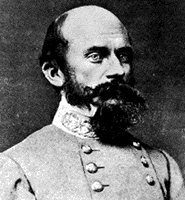
|
|
VITAL STATISTICS
|
BORN: 1817 in the District of Columbia.
DIED: 1872 in Spring Hill, TN.
CAMPAIGNS: First Bull Run, Cedar Mountain, Shenandoah Valley, Seven Days, Groveton, Gettysburg, Spotsylvania and Sayler's Creek .
HIGHEST RANK ACHIEVED: Lieutenant General.
|
|
BIOGRAPHY
|
| Richard Stoddert Ewell was born in the District of Columbia, on February 8, 1817. When he was nine years old, his family moved to Prince William County, Virginia. Like his brother Benjamin, he attended the US Military Academy, and graduated in 1940. Richard Ewell was commissioned in the 1st US Dragoons, and was brevetted a captain for his service in the Mexican War. He served in Baltimore, then in the Southwest. At the beginning of the Civil War, he was in Virginia on sick leave. He resigned his commission in the US Army in May of 1861, then became a colonel in the Confederate army. After working as commander of a camp of cavalry instruction, he was appointed a brigadier general on June 17, 1861. On January 24, 1862, he was promoted to major general, and led troops at the Battles of Bull Run (First) and Cedar Mountain, and in the Shenandoah Valley and Seven Days' Campaigns. Ewell lost a leg in the Battle of Groveton in 1862, but obtained a wooden one, with which he returned to duty in 1863. A lieutenant general, he was sent to replace Thomas J. "Stonewall" Jackson was commander of the II Corps. Ewell found riding difficult and was wounded twice, but remained active in the campaigns from Gettysburg to Spotsylvania Court House. Ewell, affectionately called "Old Bald Head" by his troops, fell from a horse at "Bloody Angle," and was unable to continue field command. He was given command of the Department of Henrico, then the defenses of Richmond. In April of 1865, he was captured at Sayler's Creek, and held prisoner at Fort Warren, Massachusetts, until August. After the Civil War, Ewell spent his retirement on a farm near Spring Hill, Tennessee. Some blamed him for the defeat of the Confederates at Gettysburg, because of his failure to capture Cemetery Hill. Nevertheless, it is unlikely that his securing of the position could have, in itself, brought about a Confederate victory. Ewell died in Spring Hill on January 25, 1872. |
|